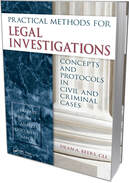
In Dean’s book, ‘Practical Methods for Legal Investigations: Concepts and Protocols in Civil and Criminal Cases’ – (www.PracticalMethodsForLegalInvestigations.com) the process of legal investigation, including conducting these types of investigations, is Prepare, Inquire, Analyze, Document, and Report.
In past months we shared some insight into each of the preceding steps of Dean’s developed professional investigative protocol – Prepare, Inquire, Analyze and document – at www.DeathCaseReview.com/afi-llc-blog. This month we will talk about the natural transition to Report.
The most important document the legal investigator, or expert, produces is their written report. Herein, ‘report’ refers to any written communication to the client. This report may be shared with clients, attorneys, insurances companies, judges, juries and even law enforcement. Just as the legal investigator reviews dozens of reports, so too will those same parties review the legal investigator’s report. It must not only be concise and factual, but also be free of errors that may diminish the perceptual quality of the report and work-product of the legal investigator. Reports may also include confidential memos. Prior to drafting any reports, it is important to determine from the client what is expected. This is particularly important to discovery and disclosure sensitive issues. It is also important to agree with the client on intervals of any reports.
In each report detail specific assignment progress and case status. This would include the status of any ongoing, suspended, or changed assignments. New findings, conflicting findings, mitigating and aggravating information are important to convey. Include the who, what, when, where, and how of each assignment and how they interconnect – from other parties to information, facts and evidence.
What does this Investigative Protocol do?
Legal Investigation, in both civil and criminal matters, is simply a progression from information and leads to the next assignment. It should flow naturally, and be flexible based upon the needs of the case, progress of the case, and developed information.
Legal investigators are fact finders, for better or for worse for the client. As such, legal investigators have a duty to the attorney-client to present a complete picture so that they may better assist the attorney in advocating for their client.


